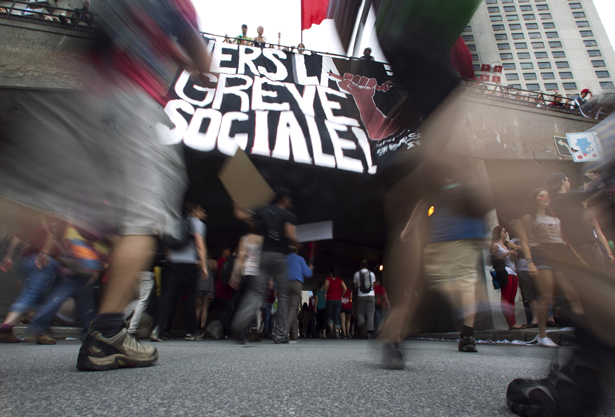
Demonstrators protest against student tuition hikes in downtown Montreal, Quebec, May 22, 2012. Tens of thousands marched on Tuesday in a rally marking 100 days of student protests. The banner reads, "towards social strike". REUTERS/Christinne Muschi
This is what international solidarity looks like.
Below is a statement of solidarity from Chilean academics and student leaders with the ongoing student protests in Montréal, Québéc, Canada. (English translation via Translating The Revolution.)
We Are All Québécois!
We the undersigned, Chilean academics and student leaders, denounce to national and international public opinion the persecution of the student movement in Québéc, Canada, expressed in Act 78, which was enacted on Thursday, May 19 by the government of Prime Minister Jean Charest.
Act 78—or the “Loi Matraque” (Rattle Law)—is the harshest since the War Measures Act in October 1970. It has been denounced by the President of the Bar of that province, as well as by Amnesty International, the Human Rights League, the four main trade unions, and various academic bodies.
It co-opts the fundamental freedoms of the citizens of Québéc by fundamentally restricting freedom of expression, freedom to demonstrate, and freedom of assembly, which are enshrined in both the Constitution and Québéc’s Charter of Rights. This law affects not only the students who have been on strike for fifteen weeks against higher tuition, but also all citizens—particularly teachers, academics, and workers, whose rights of expression and assembly are being affected.
Amongst these measures we denounce those that prevent spontaneous demonstrations of any group of more than fifty persons; the prohibition on protesting within fifty meters of a school; and the strengthening of police power by allowing police to decide at any time if a demonstration is legal or illegal, or if someone is an agitator.
By the same token, this law punishes any public expression of support for the demonstrations. For example, nobody in Québéc during a conflict may prevent the entry of students to colleges and universities, on pain of individual fines, fines to the student association or unions they belong to, as well as fines to union and student leaders. These penalties range from CA$1,000 to CA$125,000. Student leadership have announced they will challenge this law in court for being unconstitutional, and they have called for solidarity from all citizens.
The people of Québéc have for years stood by the Chilean people with their active solidarity. That’s why today we feel called to express and demonstrate our fullest solidarity with their student organizations and their leaders, with their labor unions, and with all citizen activists.
We do this for solidarity, but also because we understand that any attack against the freedoms of any place in the globalized world is an attack on our freedoms.
The so-called “Ley Hinzpeter” (Hinzpeter Law) driven by the Chilean government is part of the same repressive and undemocratic perspective.
The struggle of students, academics, and workers in Québéc is also our struggle.
Santiago de Chile, May 24, 2012.


